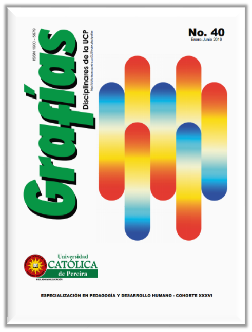The actions of the students from their voices in the Fundación Manos Unidas de Dios, in Armenia, Quindío
DOI:
https://doi.org/10.31908/grafias.v0i40.2638Keywords:
Loss, repetition, attrition, learning problems, students, pedagogy and human sensitivityAbstract
The following article is the result of research and analysis in the Specialization in Pedagogy and Human Development, whose starting point was the actions of the students from their voices at the Manos Unidas de Dios Foundation, in Armenia, Quindío. The research work was based on a mixed methodology that consisted of the use of tools, such as surveys with open and closed questions, and intellectual exams, to diagnose the learning problems of the students of the program. In the same way, the research made it possible to collect data that yielded answers about the loss, repetition and desertion of students belonging to the training school
References
Albarracín Rodríguez, A. P. y Montoya Arenas, D. A. (2015). Programas de intervención para Estudiantes Universitarios con bajo rendimiento académico. Revista Informes Psicológicos, 16(1), 13-34. http://dx.doi.org/10.18566/infpsicv16n1a01
Anastasi, A. y Urbina S. (1998). Test Psicológicos. Pearson Educación. http://www.bibliopsi.org/docs/carreras/obligatorias/CFG/psicometricas/mikulic/ANASTASI%20FINAL%20TEST%20PSICOLOGICOS.pdf
Alvira Martin, F. (2011) La encuesta una perspectiva general metodológica. Caslon.
Ferrel Ortega, F., Vélez Mendoza, J. y Ferrel Ballestas, L. (2014). Factores psicológicos en adolescentes escolarizados con bajo rendimiento académico: depresión y autoestima. Revista Encuentros, 12(2), 35-47. https://www.redalyc.org/pdf/4766/476655660003.pdf
Juan Carlos Hernández Martín, Isabel Reinoso Castillo y Carlos Mario Alonso Echevarría (2017): “El componente laboral investigativo en la unidad docente. Su
influencia en la formación de docentes integrales”, Revista Atlante: Cuadernos de Educación y Desarrollo (abril 2017) ISSN: 1989-4155 (2oEP). En línea: http://www.eumed.net/rev/atlante/2017/04/docente.html.
Meneses Botina, W. G., Morillo Carlosama, S. L., Navia Atoy, G. E., & Grisales Grisales, M. C. (2013). Factores que afectan el rendimiento escolar en la institución educativa rural Las mercedes
desde la perspectiva de los actores institucionales.Plumilla Educativa, No 11(1), pp. 433-452. https://doi.org/10.30554/plumillaedu.11.364.2013.
Medina Rivilla, A., Domínguez Garrido, M. y Sánchez Romero, C. (2013). Evaluación de las competencias de los estudiantes: modelos y técnicas para la valoración. Revista de Investigación Educativa, 31(1),239-255. http://dx.doi.org/10.6018/rie.31.1.157601
Molina Cortes, G. (2017). Taller técnicas de estudio: Proyecto creciendo: España. Compútense Madrid. http://ampaiesalpedrete.org/wp-content/uploads/2017/09/Proyecto-TallerTecnicasEstudio.pdf
Murcia Peña, N., Ramírez, C. A. y Ospina, H. F. (2012). La investigación en educación y pedagogía en el eje cafetero.
Revista Latinoamericana de Estudios Educativos, 8(1), 11- 38. https://www.redalyc.org/pdf/1341/134129256002.pdf
Pereira Pérez, Z. (2011). Los diseños de método mixto en la investigación en educación: Una experiencia concreta. Revista Electrónica Educare, XV(1), 15-29. https://www.redalyc.org/pdf/1941/194118804003.pdf
Rodríguez Gómez, G., Gil Flores, J. y García Jiménez, E. (1996). Metodología de la Investigación Cualitativa. Aljibe.
Strauss, A. y Corbin, J. (2002). Bases de la investigación cualitativa. Técnicas y procedimientos para desarrollar la teoría fundamentada. Editorial Universidad de Antioquia. https://diversidadlocal.files.wordpress.com/2012/09/basesinvestigacion-cualitativa.pdf
Sanz Ponce, J. R. y Serrano Sarmiento, A. (2016). El desarrollo de capacidades en la educación. Una cuestión de justicia social. Sinéctica no.46 Tlaquepaque ene. /jun. 2016 (pp.1-3). http://www.scielo.org.mx/pdf/sine/n46/1665-109X-sine-46-00004.pdf
Vanegas, L. P., Vanegas, C., Ospina, O. H. y Restrepo, P. A. (2016). Entre la discapacidad y los estilos de aprendizaje:
múltiples significados frente a la diversidad de capacidades. Revista Latino Americana de Estudios Educativos, 12(1), 107-131.
http://vip.ucaldas.edu.co/latinoamericana/downloads/Latinoamericana12(1)7.pdf
Vilafranca Manguan, I. y Buxarrais Estrada, R. (2009). La Educación para la Ciudadanía en clave Cosmopolitan. La propuesta de Martha Nussbaum. Revista Española de Pedagogía, año LXVII no 242 (pp.115-130) Recuperado el 18 de noviembre de: https://reunir.unir.net/bitstream/handle/123456789/3896/LaEducacionParaLaCiudadaniaEnClaveCosmopolita.pdf?sequence=1.
Anastasi, A. y Urbina S. (1998). Test Psicológicos. Pearson Educación. http://www.bibliopsi.org/docs/carreras/obligatorias/CFG/psicometricas/mikulic/ANASTASI%20FINAL%20TEST%20PSICOLOGICOS.pdf
Alvira Martin, F. (2011) La encuesta una perspectiva general metodológica. Caslon.
Ferrel Ortega, F., Vélez Mendoza, J. y Ferrel Ballestas, L. (2014). Factores psicológicos en adolescentes escolarizados con bajo rendimiento académico: depresión y autoestima. Revista Encuentros, 12(2), 35-47. https://www.redalyc.org/pdf/4766/476655660003.pdf
Juan Carlos Hernández Martín, Isabel Reinoso Castillo y Carlos Mario Alonso Echevarría (2017): “El componente laboral investigativo en la unidad docente. Su
influencia en la formación de docentes integrales”, Revista Atlante: Cuadernos de Educación y Desarrollo (abril 2017) ISSN: 1989-4155 (2oEP). En línea: http://www.eumed.net/rev/atlante/2017/04/docente.html.
Meneses Botina, W. G., Morillo Carlosama, S. L., Navia Atoy, G. E., & Grisales Grisales, M. C. (2013). Factores que afectan el rendimiento escolar en la institución educativa rural Las mercedes
desde la perspectiva de los actores institucionales.Plumilla Educativa, No 11(1), pp. 433-452. https://doi.org/10.30554/plumillaedu.11.364.2013.
Medina Rivilla, A., Domínguez Garrido, M. y Sánchez Romero, C. (2013). Evaluación de las competencias de los estudiantes: modelos y técnicas para la valoración. Revista de Investigación Educativa, 31(1),239-255. http://dx.doi.org/10.6018/rie.31.1.157601
Molina Cortes, G. (2017). Taller técnicas de estudio: Proyecto creciendo: España. Compútense Madrid. http://ampaiesalpedrete.org/wp-content/uploads/2017/09/Proyecto-TallerTecnicasEstudio.pdf
Murcia Peña, N., Ramírez, C. A. y Ospina, H. F. (2012). La investigación en educación y pedagogía en el eje cafetero.
Revista Latinoamericana de Estudios Educativos, 8(1), 11- 38. https://www.redalyc.org/pdf/1341/134129256002.pdf
Pereira Pérez, Z. (2011). Los diseños de método mixto en la investigación en educación: Una experiencia concreta. Revista Electrónica Educare, XV(1), 15-29. https://www.redalyc.org/pdf/1941/194118804003.pdf
Rodríguez Gómez, G., Gil Flores, J. y García Jiménez, E. (1996). Metodología de la Investigación Cualitativa. Aljibe.
Strauss, A. y Corbin, J. (2002). Bases de la investigación cualitativa. Técnicas y procedimientos para desarrollar la teoría fundamentada. Editorial Universidad de Antioquia. https://diversidadlocal.files.wordpress.com/2012/09/basesinvestigacion-cualitativa.pdf
Sanz Ponce, J. R. y Serrano Sarmiento, A. (2016). El desarrollo de capacidades en la educación. Una cuestión de justicia social. Sinéctica no.46 Tlaquepaque ene. /jun. 2016 (pp.1-3). http://www.scielo.org.mx/pdf/sine/n46/1665-109X-sine-46-00004.pdf
Vanegas, L. P., Vanegas, C., Ospina, O. H. y Restrepo, P. A. (2016). Entre la discapacidad y los estilos de aprendizaje:
múltiples significados frente a la diversidad de capacidades. Revista Latino Americana de Estudios Educativos, 12(1), 107-131.
http://vip.ucaldas.edu.co/latinoamericana/downloads/Latinoamericana12(1)7.pdf
Vilafranca Manguan, I. y Buxarrais Estrada, R. (2009). La Educación para la Ciudadanía en clave Cosmopolitan. La propuesta de Martha Nussbaum. Revista Española de Pedagogía, año LXVII no 242 (pp.115-130) Recuperado el 18 de noviembre de: https://reunir.unir.net/bitstream/handle/123456789/3896/LaEducacionParaLaCiudadaniaEnClaveCosmopolita.pdf?sequence=1.


